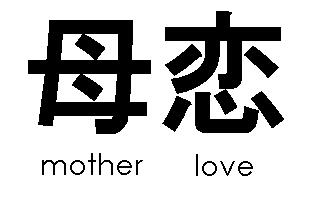We Interrupt Our Regularly Scheduled Programming...
...for this special Mother's Day bulletin.
I drove over to Cape Chikyu today, because the weather was nice and I wanted to get out of the house. On the way there, I drove through the Bokoi area of Muroran.
Bokoi, like most of the other place names in Hokkaido, originally comes from an Ainu word, but after Japanese people moved up here, they matched up kanji characters to fit the sounds of the place names. For Bokoi, they used the character for "mother", which can be read as "bo", and the character for "love", which can be read as "koi".
Like so.

This makes Bokoi a popular area to visit. It also helps that it's the area you need to go to so you can get out to Cape Chikyu.
I swung by Bokoi Station and picked up a commemorative ticket for my Mom.

It's not much, but what with me being here and her being over there for Mother's Day, I did what I could. The message on the ticket reads,
I also picked up the regular, non-Mother's Day ticket. It's got a picture of Cape Chikyu on it.
Anyway, Mom, Happy Mother's Day! I love you!
I drove over to Cape Chikyu today, because the weather was nice and I wanted to get out of the house. On the way there, I drove through the Bokoi area of Muroran.
Bokoi, like most of the other place names in Hokkaido, originally comes from an Ainu word, but after Japanese people moved up here, they matched up kanji characters to fit the sounds of the place names. For Bokoi, they used the character for "mother", which can be read as "bo", and the character for "love", which can be read as "koi".
Like so.

This makes Bokoi a popular area to visit. It also helps that it's the area you need to go to so you can get out to Cape Chikyu.
I swung by Bokoi Station and picked up a commemorative ticket for my Mom.

It's not much, but what with me being here and her being over there for Mother's Day, I did what I could. The message on the ticket reads,
Thanks for everything, Mom. 2006.5.14 Mother's Day Commemoration. JR Hokkaido. From Bokoi to Higashi Muroran.On the back of the ticket is an explanation of what Mother's Day is.
The second Sunday in May is Mother's Day. It originally began as a Christian celebration in America. It came to Japan during the Taisho Era. It is a day to express your thanks to your mother for all the hard work she does for the family, usually by giving her a carnation or some other gift.Sorry, Mom. No carnation. But I did get you this nifty ticket!
I also picked up the regular, non-Mother's Day ticket. It's got a picture of Cape Chikyu on it.
Anyway, Mom, Happy Mother's Day! I love you!



1 Comments:
Thanks, Dust! I love you too!
Post a Comment
<< Home